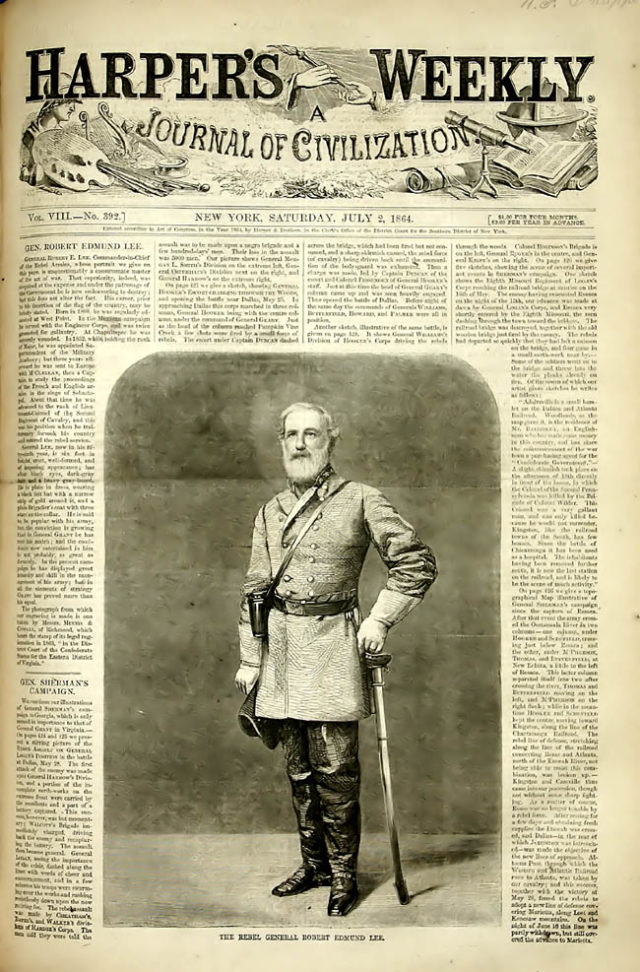
Harper’s Weekly, July 2, 1864
During a tour through the South in 1905, President Theodore Roosevelt told the aged Confederate veterans in Richmond, Virginia, “Here I greet you in the shadow of the statue of your commander, General Robert E. Lee. You and he left us memories which are part of the memories bequeathed to the entire nation by all the Americans who fought in the War Between the States.”
January 19, 2020, is the 213th birthday of Robert E. Lee.
During Robert E. Lee’s 100th birthday in 1907, Charles Francis Adams, Jr., a former Union Commander and grandson of US President John Quincy Adams, spoke in tribute to Robert E. Lee at Washington and Lee College’s Lee Chapel in Lexington, Virginia. His speech was printed in both Northern and Southern newspapers and is said to had lifted Lee to a renewed respect among the American people.
Robert E. Lee, a man whose military tactics have been studied worldwide, was an American soldier, Educator, Christian gentlemen, husband and father.
Robert E. Lee was born at Stratford Hall, Westmoreland County, Virginia, on January 19, 1807. The winter was cold and fireplaces were little help. Robert’s mother, Ann Hill (Carter) Lee, was also suffering from a severe cold.
Robert E. Lee undoubtedly acquired his love of country from those who had lived during the American Revolution. His father, “Light Horse” Harry, was a hero of the revolution and served as Governor of Virginia and as a member of the U.S. House of Representatives. Members of his family also signed the Declaration of Independence.
Lee was educated in the schools of Alexandria, Virginia. In 1825, he received an appointment to United States Military Academy at West Point. He graduated in 1829, second in his class and without a single demerit.
Robert E. Lee wed Mary Anna Randolph Custis in June 1831, two years after his graduation from West Point. Robert and Mary had grown up together. Mary was the daughter of George Washington Parke Custis, the grandson of Martha Washington and the adopted son of George Washington.
Mary was an only child; therefore, she inherited Arlington House, across the Potomac from Washington, where she and Robert raised seven children.
Army promotions were slow. In 1836, Lee was appointed to first lieutenant. In 1838, with the rank of captain, Lee fought valiantly in the War with Mexico and was wounded at the Battle of Chapultepec.
Lee was appointed Superintendent of The United States Military Academy at West Point in 1852 and is considered one of the best superintendents in that institution’s history.
General Winfield Scott offered Robert E. Lee command of the Union Army in 1861, but he refused. He said, “I cannot raise my hand against my birthplace, my home, my children.”
Lee served as adviser to President Jefferson Davis, and then on June 1, 1862, commanded the legendary Army of Northern Virginia.
In 1865 General Robert E. Lee met General Ulysses S. Grant at Appomattox, Virginia, and ended their battles.
Lee was called Marse Robert, Uncle Robert and Marble Man. He was loved by the people of the South, and adopted by the folks from up North.
Robert E. Lee was a man of honor, proud of his name and heritage. After the War Between the States, he was offered $50,000 for the use of his name. His reply was: “Sirs, my name is the heritage of my parents. It is all I have and it is not for sale.”
In the autumn of 1865, Lee was offered and accepted the presidency of troubled Washington College in Lexington, Virginia. The school was renamed Washington and Lee in his honor.
Robert E. Lee died of a heart attack at 9:30 on the morning of October 12, 1870, at Washington-Lee College.
Booker T. Washington, America’s great Black-American Educator wrote in 1910, “The first white people in America, certainly the first in the South to exhibit their interest in the reaching of the Negro and saving his soul through the medium of the Sunday-school were Robert E. Lee and Stonewall Jackson.”
Lest We Forget!
Written by Calvin E. Johnson Jr.t for Canada Free Press ~ January 19, 2020
